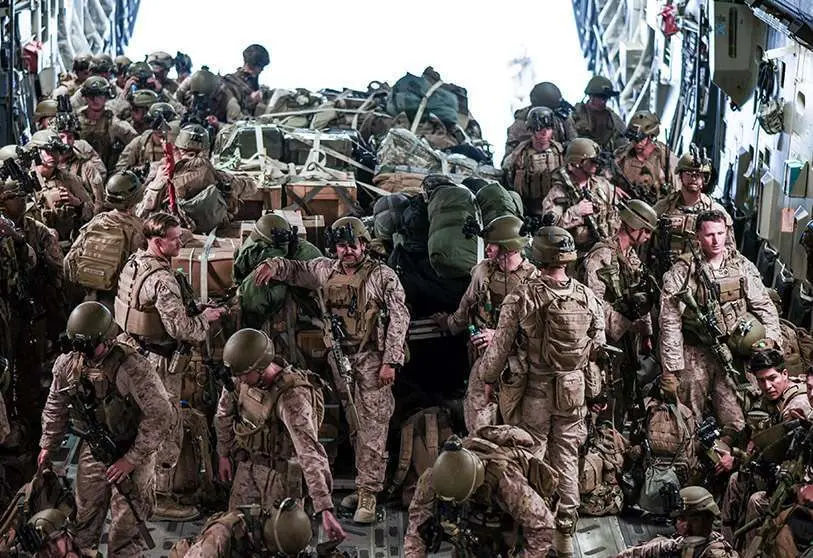Afghan humiliation of Goliath

Empires do not last forever. The fall of US hegemony in the 21st century can only be halted by another great world war.
The loss of US hegemony, dominance, credibility and leadership in the great global village will continue to be accompanied by economic displacement and, ultimately, by the fall of the reign of the dollar.
The American Union has fought several wars in contemporary times that serve its individual interests; its war power and supremacy have long commanded fear and respect. Now, a small, rugged, tribal country with a host of social, human and economic problems, but rich in opium production and the cradle of many terrorist movements, stands up to Goliath and twenty years later drives him out in a humiliating way.
And dangerous: because the message is powerful, especially for the terrorist groups that operate under the jihadist Salafism in several countries of the Islamic world and are many disaggregated cells nourished by their hatred of the United States... their hatred of everything that the West represents, which are the opposite values to everything they defend in their stubborn fundamentalism.
At the time of writing this column, a major terrorist attack has just taken place in Kabul, right at the Abbey Gate of Hamid Karzai Airport, leaving 170 civilians dead, 13 US military personnel dead and hundreds wounded.
The conflagration claimed by the Islamic State has put President Joe Biden in a delicate position: either stay with the troops in Afghanistan and wage a serious war with the Taliban and the Islamic State and all the forces opposed to continuing the occupation; or withdraw, which means not responding immediately to the damage caused, continuing with the agreed evacuation, complying with the timetable and completing the mission by withdrawing the troops by 31 August.
Biden has opted for the second option, but not before making it clear that, in due course, his country will hunt down and make those guilty of the damage done pay. Prudence or weakness? Knowing the full potential of the US military, in my view this is more than anything else a sign of weakness and a loss of a sense of strategy that will itself have consequences in the West.
Hardly had the allies been celebrating - like a breath of fresh air - the arrival of Democrat Biden in the White House, after four years of frenetic disagreements with Republican Donald Trump, when the US military's hasty "flight" from Afghanistan precipitated the same races in the other NATO military contingents.
Another rift has opened up between the European allies and the United States, triggered by a disagreement over how to leave and how to manage the evacuation of Afghan nationals and aid workers amid chaos around Kabul airport.
British Prime Minister Boris Johnson called a historic virtual emergency meeting of G7 member states, accompanied by the highest authorities of the European Union (EU); the basic intention was for the leaders of the Western world to find a roadmap first, to obtain more time to continue the evacuations from Kabul, and second, to have a common front towards the evacuation of Afghan nationals and aid workers from Kabul; second, to have a common front on how to engage with the Taliban without recognising them as a government; third, to ensure common security against terrorism; and fourth, humanitarian aid to Afghanistan to prevent a new exodus to Europe.
Biden ended the meeting in seven minutes with a refusal to stay beyond 31 August. It is unclear how many foreigners remain in Afghanistan, but the Taliban, who are to form a government, have told German diplomats that they will allow commercial flights and the departure of people who wish to do so. Germany has promised to increase humanitarian aid to Afghanistan.
The same was announced by Ursula von der Leyen, president of the European Commission, who quadrupled humanitarian aid from 57 million euros to 200 million euros, although she froze one billion euros of development programmes until the Taliban respect human rights.
The allies are entering a cathartic phase of evaluating their presence in Afghanistan, invoked by President George Walker Bush's activation of NATO's Article 5 after the attacks of 11 September 2001, which pointed to Saudi Arabia's Osama Bin Laden and Al Qaeda as the perpetrators of the deplorable terrorist acts.
Bush held out to the US Congress that Bin Laden was in Afghanistan, and so the invasion and an extraordinary budget for the Pentagon were approved. The paradox is that President Barack Obama announced to his country that Bin Laden was killed by Seal special forces - on the night of May 2, 2011 - in a house in Abbottabad, Afghanistan. One more paradox of an invasion full of mistakes and lies...

